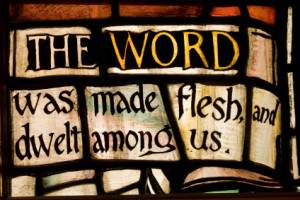 Forget for a moment that you live 2000 years after the death of Jesus Christ on the cross, and forget that you have the New Testament which tells you about who Jesus was and what He did. Imagine that you pick up an ancient history book and it tells you about three men who were put to death around 33 BC for religious and political crimes. Two of them were criminals and one was a rabble-rouser, a trouble-maker, and a blasphemer. If you knew nothing else about these three men, you would assume they were most likely guilty.
Forget for a moment that you live 2000 years after the death of Jesus Christ on the cross, and forget that you have the New Testament which tells you about who Jesus was and what He did. Imagine that you pick up an ancient history book and it tells you about three men who were put to death around 33 BC for religious and political crimes. Two of them were criminals and one was a rabble-rouser, a trouble-maker, and a blasphemer. If you knew nothing else about these three men, you would assume they were most likely guilty.
Imagine furthermore that rather than living 2000 years after the fact, you were a Jewish person who lived at the time of Jesus. If you had heard anything from the Jewish rabbis of your day, you would know that this man named Jesus was a threat to the peace, order, safety, and security of your life within the Roman Empire.
If Jesus was the Messiah, as He claimed, He would rise up in revolt against the Roman invaders, but since He clearly did not want to go to war with the Romans, and since He often said things that directly challenged the traditions and teachings of the religious leaders, and sometimes He even seemed to say blasphemous things about the Temple and about YHWH Himself, well, Jesus was guilty. He had to die because He was guilty.
And when He did die, they hung Him on a cross. It was a gruesome sight, but that was evidence enough of His guilt. God had seen fit to judge this blasphemer named Jesus by hanging Him on a tree, for as the Scriptures say, “Cursed is everyone who hangs on a tree.”
Yes, this was evidence that God also was upset about what this man named Jesus was teaching, and had seen fit to make Him a public spectacle in the sight of all so that nobody would ever again seek to challenge the teachings of the religious leaders or the traditions of the Jewish people.
Yes, if you were a Jew living 2000 years ago, and if you saw Jesus hanging on the cross, you most likely would have thought that He was a guilty criminal who had come under the curse of God. You would be revolted and sickened by His appearance.
But looking back now, we know that Jesus was not guilty. He did not sin. He died a criminal’s death because He went there willingly, as a sacrifice for the sins of the whole world, to take our sins upon Himself and bear them into death. But we only know this because Jesus rose from the dead and told His disciples that this is what happened, and the disciples taught it to others and wrote about it in the Bible, and the Apostle Paul—the greatest theologian in history—wrote about this theme in many of his letters.

So it is also with God.
From our human perspective, a God who enters into human affairs in the way that God did in the Old Testament looks guilty. Just like Jesus on the cross. As outsiders, when we look upon the appearance of God in the Old Testament, we see a guilty criminal who is doing things that nobody should ever do. This also is exactly the way some people looked at Jesus. When we read about some of the brutal and bloody things that the Israelites did in God’s name, God appears ugly and revolting. In many of the depictions there is no beauty or comeliness, that we should desire Him. He is despised and rejected by many. We do not esteem Him. Just like Jesus (cf. Isa 53:1-3).




 We typically think of the incarnation as something that happened only when Jesus Christ became human, that is, when He was born of a virgin, grew up as a boy under the parentage of Joseph and Mary, became a man, and then lived, taught, ministered, suffered, and died. Strictly speaking, this is probably true. The definition of “incarnate” is “to become flesh.” So prior to the coming of Jesus Christ in the flesh, it is not exactly accurate to say that God was in the flesh—that God was human. God only became human when He entered the womb of a woman and grew up as a human, just like one of us.
We typically think of the incarnation as something that happened only when Jesus Christ became human, that is, when He was born of a virgin, grew up as a boy under the parentage of Joseph and Mary, became a man, and then lived, taught, ministered, suffered, and died. Strictly speaking, this is probably true. The definition of “incarnate” is “to become flesh.” So prior to the coming of Jesus Christ in the flesh, it is not exactly accurate to say that God was in the flesh—that God was human. God only became human when He entered the womb of a woman and grew up as a human, just like one of us.
 Christian unity is one of the highest Christian goals, which is why we are always encouraging one another to grow in unity.
Christian unity is one of the highest Christian goals, which is why we are always encouraging one another to grow in unity.



 One common objection to the proposal I am making in my series on how to understand the violence of God in the Old Testament (see the link list below) is that this view seems to make God out to be a liar.
One common objection to the proposal I am making in my series on how to understand the violence of God in the Old Testament (see the link list below) is that this view seems to make God out to be a liar.
 Did you hear
Did you hear 


 So I went and looked it up.
So I went and looked it up.
 Nelson Mandela once said “Courage was not the absence of fear, but the triumph over it. The brave man is not he who does not feel afraid, but he who conquers that fear.”
Nelson Mandela once said “Courage was not the absence of fear, but the triumph over it. The brave man is not he who does not feel afraid, but he who conquers that fear.”
 This is a guest post by Vince Latorre. As a young boy, Vince always had an inquisitive nature. He immediately wanted the answers to questions such as “Is there a God?” “How did I get here?” “How was the world and universe created?” His search for answers to these questions led him to a personal encounter with Christ at age nine or ten. As his faith grew, his desire to analytically research and validate the Word of God intensified.
This is a guest post by Vince Latorre. As a young boy, Vince always had an inquisitive nature. He immediately wanted the answers to questions such as “Is there a God?” “How did I get here?” “How was the world and universe created?” His search for answers to these questions led him to a personal encounter with Christ at age nine or ten. As his faith grew, his desire to analytically research and validate the Word of God intensified. Let me give you six different ways you can explain these supposedly fatal contradictions.
Let me give you six different ways you can explain these supposedly fatal contradictions.